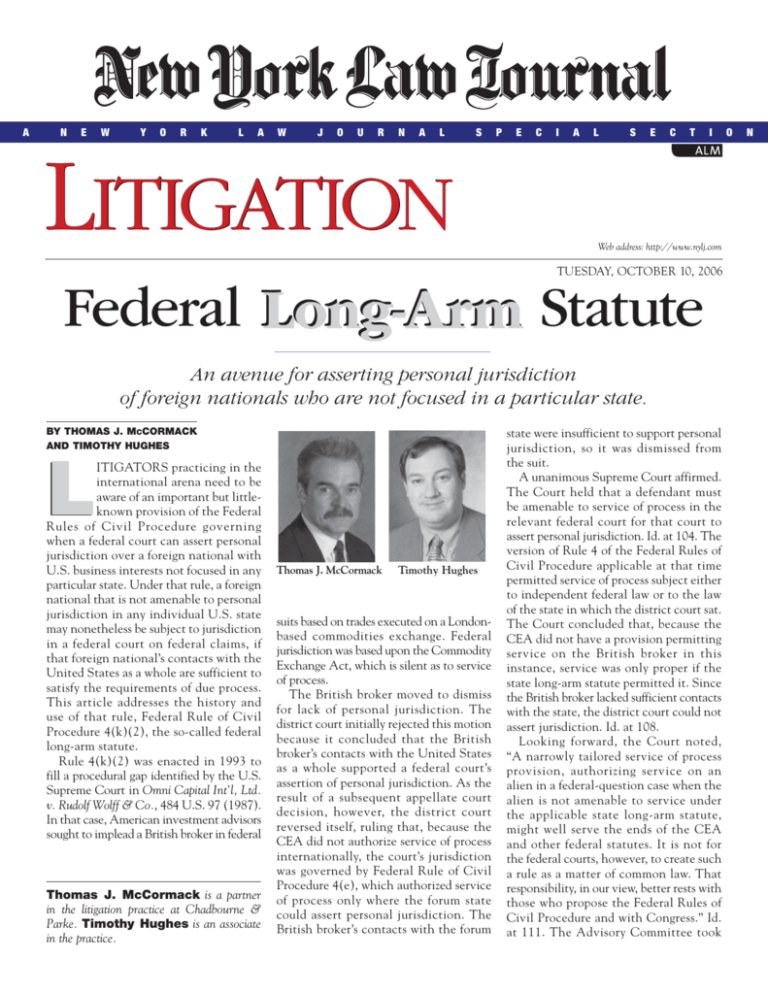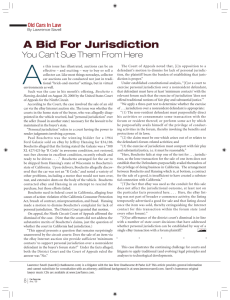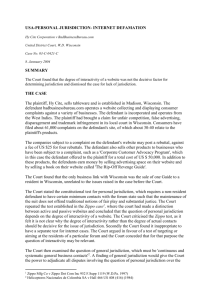
A
N
E
W
Y
O
R
K
L
A
W
J
O
U
R
N
A
L
S
LITIGATION
P
E
C
I
A
L
S
E
C
T
I
Web address: http://www.nylj.com
TUESDAY, OCTOBER 10, 2006
Federal Long-Arm Statute
An avenue for asserting personal jurisdiction
of foreign nationals who are not focused in a particular state.
BY THOMAS J. MCCORMACK
AND TIMOTHY HUGHES
L
ITIGATORS practicing in the
international arena need to be
aware of an important but littleknown provision of the Federal
Rules of Civil Procedure governing
when a federal court can assert personal
jurisdiction over a foreign national with
U.S. business interests not focused in any
particular state. Under that rule, a foreign
national that is not amenable to personal
jurisdiction in any individual U.S. state
may nonetheless be subject to jurisdiction
in a federal court on federal claims, if
that foreign national’s contacts with the
United States as a whole are sufficient to
satisfy the requirements of due process.
This article addresses the history and
use of that rule, Federal Rule of Civil
Procedure 4(k)(2), the so-called federal
long-arm statute.
Rule 4(k)(2) was enacted in 1993 to
fill a procedural gap identified by the U.S.
Supreme Court in Omni Capital Int’l, Ltd.
v. Rudolf Wolff & Co., 484 U.S. 97 (1987).
In that case, American investment advisors
sought to implead a British broker in federal
Thomas J. McCormack is a partner
in the litigation practice at Chadbourne &
Parke. Timothy Hughes is an associate
in the practice.
Thomas J. McCormack
Timothy Hughes
suits based on trades executed on a Londonbased commodities exchange. Federal
jurisdiction was based upon the Commodity
Exchange Act, which is silent as to service
of process.
The British broker moved to dismiss
for lack of personal jurisdiction. The
district court initially rejected this motion
because it concluded that the British
broker’s contacts with the United States
as a whole supported a federal court’s
assertion of personal jurisdiction. As the
result of a subsequent appellate court
decision, however, the district court
reversed itself, ruling that, because the
CEA did not authorize service of process
internationally, the court’s jurisdiction
was governed by Federal Rule of Civil
Procedure 4(e), which authorized service
of process only where the forum state
could assert personal jurisdiction. The
British broker’s contacts with the forum
state were insufficient to support personal
jurisdiction, so it was dismissed from
the suit.
A unanimous Supreme Court affirmed.
The Court held that a defendant must
be amenable to service of process in the
relevant federal court for that court to
assert personal jurisdiction. Id. at 104. The
version of Rule 4 of the Federal Rules of
Civil Procedure applicable at that time
permitted service of process subject either
to independent federal law or to the law
of the state in which the district court sat.
The Court concluded that, because the
CEA did not have a provision permitting
service on the British broker in this
instance, service was only proper if the
state long-arm statute permitted it. Since
the British broker lacked sufficient contacts
with the state, the district court could not
assert jurisdiction. Id. at 108.
Looking forward, the Court noted,
“A narrowly tailored service of process
provision, authorizing service on an
alien in a federal-question case when the
alien is not amenable to service under
the applicable state long-arm statute,
might well serve the ends of the CEA
and other federal statutes. It is not for
the federal courts, however, to create such
a rule as a matter of common law. That
responsibility, in our view, better rests with
those who propose the Federal Rules of
Civil Procedure and with Congress.” Id.
at 111. The Advisory Committee took
O
N
TUESDAY, OCTOBER 10, 2006
NEW YORK LAW JOURNAL
up this invitation, and Rule 4(k)(2) is
the result.
purposes. Int’l Brotherhood of Teamsters, 945
F.Supp. at 618.
Three Requirements
Jurisdiction in Any State
Rule 4(k)(2) provides: “If the exercise
of jurisdiction is consistent with the
Constitution and laws of the United
States, serving a summons or filing a
waiver of service is also effective, with
respect to claims arising under federal law,
to establish personal jurisdiction over the
person of any defendant who is not subject
to the jurisdiction of the courts of general
jurisdiction of any state.”
To establish jurisdiction under Rule
4(k)(2), the plaintiff must demonstrate
that: (1) it has a cause of action arising
under federal law, and is not relying upon
diversity jurisdiction in bringing a suit in
federal court, United States v. Int’l Brotherhood
of Teamsters, 945 F.Supp. 609, 617 (S.D.N.Y.
1996); (2) the defendant is not subject to the
jurisdiction of the courts of any state, Richards
v. Tsunami Softgoods, Inc., 239 F.Supp.2d 80,
87-88 (D. Me. 2003); and (3) the defendant’s
contacts with the United States as a whole are
sufficient to satisfy the requirements of due
process. Norvel Ltd. v. Ulstein Propeller AS,
161 F.Supp.2d 190, 206-07 (S.D.N.Y. 2001).
While case law under Rule 4(k)(2) is still
sparse, courts have examined and discussed all
three requirements.
The requirement that the claim be based
upon federal law is relatively straightforward.
Among claims that will support subjectmatter jurisdiction in federal court, only
state-law claims brought in diversity are
excluded. Thus, a claim based on a federal
statute, such as the Lanham Act, is a claim
based upon federal law. See, e.g., Pebble
Beach Co. v. Caddy, 453 F.3d 1151, 1159
(9th Cir. 2006). Claims based on admiralty
law are claims based upon federal law under
Rule 4(k)(2). Norvel Ltd., 161 F.Supp.2d at
200. Claims for which the rule of decision
will be based upon federal common law are
also claims based upon federal law under
Rule 4(k)(2). United States v. Swiss American
Bank, 191 F.3d 30, 42 (1st Cir. 1999). Finally,
a suit seeking enforcement of a decision
issued by an Election Officer overseeing
union elections pursuant to a Consent
Decree enacted under RICO (Racketeer
Influenced Corrupt Organizations Act)
has been found to be a claim arising
under federal law for Rule 4(k)(2)
The second requirement, that the
defendant at issue not be subject to the
jurisdiction of the courts of any state, is the
requirement that has raised the most unique
set of problems: How is the court to determine
that the defendant is not subject to personal
jurisdiction in any state? Is the defendant
required to cite one or more states that
can assert personal jurisdiction, in essence
forcing the defendant to consent to personal
jurisdiction there? Is the plaintiff required to
demonstrate that no state can assert personal
jurisdiction over the defendant, obligating
the plaintiff to undertake a 50-state survey
of long-arm rules and demonstrate the
defendant’s lack of contacts with every state?
Because this requirement can potentially force
a party to argue against its own interests,
courts have taken a variety of approaches to
resolving it.
xxxxxxxxxxxxxx
Judicial interpretation
of Rule 4(k)(2) is still
relatively limited. In today’s
international business
climate, however, the rule
has enormous importance.
xxxxxxxxxxxxxx
In United States v. Offshore Marine Ltd., 179
F.R.D. 156 (D. V.I. 1998), the court applied a
burden of proof analysis. Because the plaintiff
has the burden to prove that the court has
personal jurisdiction over the defendant, the
court dismissed the case when the plaintiff
was unable to demonstrate that the defendant
was not subject to personal jurisdiction in
any state.
Other courts have approached the issue in
other ways. In Int’l Brotherhood of Teamsters, the
court found this requirement satisfied because
the defendant would not be amenable to service
under the long-arm statute of the forum state.
945 F.Supp. at 618-20. In Richards v. Tsunami
Softgoods, Inc., the court held that the rule did
not apply because the defendant would likely
be subject to the personal jurisdiction of one
or two other states. 239 F.Supp.2d at 87-88.
In Norvel Ltd., the court asked the parties to
brief the issue and permitted the plaintiff to
identify the other jurisdictions most likely at
issue in its papers. 161 F.Supp.2d at 200.
Two federal courts of appeals have
formulated specific tests for this requirement.
In ISI Int’l, Inc. v. Borden Ladner Gervais
L.L.P., 256 F.3d 548 (7th Cir. 2001), the U.S.
Court of Appeals for the Seventh Circuit
noted that “one might read Rule 4(k)(2)
to make matters worse by requiring 51
constitutional decisions: The court must first
determine that the United States has power
and then ensure that none of the 50 states
does so.” The Seventh Circuit concluded,
however, that “[c]onstitutional analysis for
each of the 50 states is eminently avoidable
by allocating burdens sensibly. A defendant
who wants to preclude use of Rule 4(k)(2) has
only to name some other state in which the
suit could proceed….This procedure makes it
unnecessary to traipse through the 50 states,
asking whether each could entertain the suit.”
256 F.3d at 552. Because the defendant in
the action before the court did not concede
that it was subject to personal jurisdiction
in another state, the Seventh Circuit ruled
that this requirement of Rule 4(k)(2) was
satisfied and the defendant was not subject
to the jurisdiction of any state.
The U.S. Court of Appeals for the First
Circuit has taken a completely different
approach. In United States v. Swiss American
Bank, 191 F.3d 30 (1st Cir. 1999), the
defendants, like the defendants in Offshore
Marine, argued that the government was
required to allege facts demonstrating that
no state had personal jurisdiction over the
defendants: “This paradigm in effect requires
a plaintiff to prove a negative fifty times
over—an epistemologically quandary which
is compounded by the fact that the defendant
typically controls much of the information
needed to determine the existence and/or
magnitude of its contacts with any given
jurisdiction.” 191 F.3d at 40.
In contrast, placing the burden on a
defendant to demonstrate the applicability
of this requirement “threatens to place
a defendant in a ‘Catch-22’ situation,
forcing it to choose between conceding
its potential amenability to suit in federal
court (by denying that any state court has
jurisdiction over it) or conceding its potential
amenability to suit in some identified state
court.” Id. at 41.
To avoid this dilemma, the First Circuit
TUESDAY, OCTOBER 10, 2006
NEW YORK LAW JOURNAL
formulated a different test. First, a plaintiff
must make a prima facie case for the
applicability of Rule 4(k)(2), under which
the plaintiff would certify that, based on
information readily available, the defendant
is not subject to suit in the courts of general
jurisdiction of any state. The plaintiff would
also have to demonstrate that the defendant
has sufficient contacts with the United States
as a whole to justify the assertion of personal
jurisdiction under Rule 4(k)(2). Once this
prima facie case has been made, the burden
shifts to the defendant to produce evidence
demonstrating either that it is subject to the
personal jurisdiction of a state, or that its
contacts with the United States as a whole
are insufficient. Id.
To date, no other circuit has adopted
the First Circuit’s test.1 However, the Fifth
Circuit and the D.C. Circuit have adopted
the Seventh Circuit’s approach and shifted
the burden to the defendant to name a state
in which it is subject to personal jurisdiction.
Adams v. Unione Mediterranea Di Sicurta, 364
F.3d 646, 651 (5th Cir.), cert. denied, 543
U.S. 979 (2004); Mwani v. Bin Laden, 417
F.3d 1, 11 (D.C. Cir. 2005). Whether other
circuits will follow the lead of the Seventh
or First circuits or take their own paths
in determining how to satisfy this vexing
requirement is unclear.
Contacts With United States
The third requirement, demonstrating that
the defendant’s contacts with the United States
as a whole satisfy the requirements of due process
for the assertion of personal jurisdiction, follows
the conventional approach for demonstrating
that due process has been satisfied with respect
to state long-arm statutes. Specifically, in
determining whether the defendant has
minimum contacts with the United States,
the approach is the same as with respect to
an individual state. If the defendant’s contacts
with the United States are “continuous and
systematic,” and the exercise of jurisdiction
is reasonable, the district court can exercise
general jurisdiction over the defendant for any
claim, even one unrelated to those contacts.
If the stringent requirements for general
jurisdiction are not satisfied, the court may
still exercise specific jurisdiction over the
defendant if the claim directly relates to
or arises out of the defendant’s contacts
with the United States, the defendant has
purposely availed itself of the benefits and
protections afforded by U.S. law, and the
exercise of jurisdiction is reasonable under
the circumstances.
United States v. Swiss American Bank,
274 F.3d 610 (1st Cir. 2001), contains an
extensive analysis of general and specific
personal jurisdiction under Rule 4(k)(2).
After the district court ruled that the assertion
of personal jurisdiction would not satisfy due
process, the First Circuit concluded that, in
the absence of offices or non-sporadic direct
business activity in the United States, the
defendant’s conduct of business over the
Internet and with correspondent banks that
made it part of an international banking
community that did business in the United
States did not satisfy the “continuous and
systematic” test for general jurisdiction. 274
F.3d at 619-20.
The First Circuit then concluded that
there was an insufficient relationship
between the claims asserted in the action
and the United States to establish specific
jurisdiction. 274 F.3d at 620-22. It rejected
the plaintiff’s argument that the claims
were related to the United States because
the defendant’s actions caused “wrongful
effects” there, concluding that the analysis
of the effects of a defendant’s activities in the
forum should be focused on the defendant’s
purposeful availment of the laws of the forum
prong rather than the relatedness prong. 274
F.3d at 622-24.
Other courts have been more willing
to find specific jurisdiction’s relatedness
requirement satisfied because the defendant’s
activities caused effects in the United
States. In Int’l Brotherhood of Teamsters,
for example, the court concluded that the
assertion of personal jurisdiction satisfied due
process because, even though the defendant
transacted no business in the United States,
its interference with elections undertaken by
an international union in Canada interfered
with the United States’ ability to eliminate
corruption from the union pursuant to a
RICO consent decree. 945 F.Supp. at 621-22.
Similarly, in Mwani v. Bin Laden, the D.C.
Circuit held that al Qaeda’s bombing of U.S.
embassies in Africa satisfied the relatedness
test because their effects reverberated in
the United States, and because al Qaeda
purposefully directed its terrorist activities
at the United States. 417 F.3d at 13. As
these cases demonstrate, the due process
determination, whether for specific or
general jurisdiction, and whether focused
on a state or the United States under Rule
4(k)(2), is a fact-specific inquiry depending
upon individual contacts that each defendant
has with the United States.
Conclusion
Judicial interpretation of Rule 4(k)(2) is
still relatively limited. In today’s international
business climate, however, the rule has
enormous importance. If your client is a
foreign corporation facing litigation with a
U.S. citizen because of a business relationship
functioning largely outside the United
States, Rule 4(k)(2) may be your greatest
impediment to avoiding U.S. litigation. On
the other hand, if your client is an American
citizen in a dispute with a foreign national,
Rule 4(k)(2) offers an opportunity that
would not otherwise exist to litigate the
claim in the United States. Either way,
Rule 4(k)(2) is a rule of great potential
significance to any litigator practicing in the
international arena.
•••••••••••••
••••••••••••••••
1. The First Circuit test was recently applied by a
judge in the Southern District of New York. Porina v.
Marwood Shipping Co., Ltd., 2006 WL 2465819 at *3-*4
(S.D.N.Y. Aug. 24, 2006).
Thomas McCormack is a partner in the
litigation practice at Chadbourne & Parke
LLP and Timothy Hughes is an associate
in the practice. They are reachable at
212-408-5100 or tmccormack@chadbourne.com
and thughes@chadbourne.com
This article is reprinted with permission from
the October 10, 2006 edition of the NEW YORK
LAW JOURNAL. © 2006 ALM Properties, Inc. All
rights reserved. Further duplication without permission is prohibited. For information, contact ALM
Reprint Department at 800-888-8300 x6111 or visit
almreprints.com. #070-10-06-0012
www.chadbourne.com







